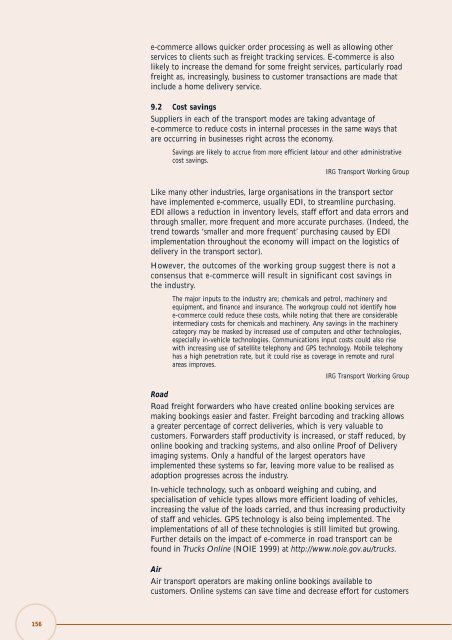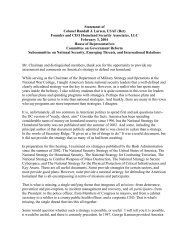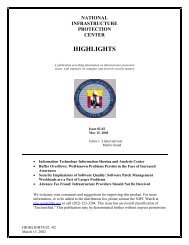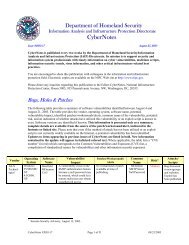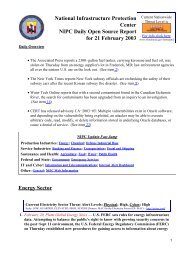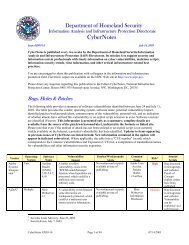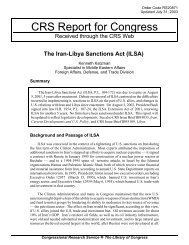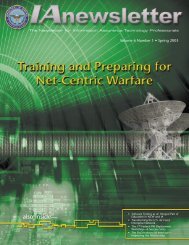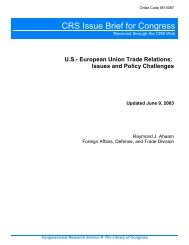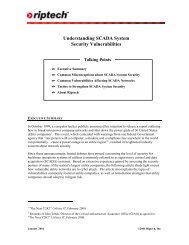beyond pt 0 23/1
beyond pt 0 23/1
beyond pt 0 23/1
Create successful ePaper yourself
Turn your PDF publications into a flip-book with our unique Google optimized e-Paper software.
e-commerce allows quicker order processing as well as allowing other<br />
services to clients such as freight tracking services. E-commerce is also<br />
likely to increase the demand for some freight services, particularly road<br />
freight as, increasingly, business to customer transactions are made that<br />
include a home delivery service.<br />
9.2 Cost savings<br />
Suppliers in each of the transport modes are taking advantage of<br />
e-commerce to reduce costs in internal processes in the same ways that<br />
are occurring in businesses right across the economy.<br />
Savings are likely to accrue from more efficient labour and other administrative<br />
cost savings.<br />
IRG Transport Working Group<br />
Like many other industries, large organisations in the transport sector<br />
have implemented e-commerce, usually EDI, to streamline purchasing.<br />
EDI allows a reduction in inventory levels, staff effort and data errors and<br />
through smaller, more frequent and more accurate purchases. (Indeed, the<br />
trend towards ‘smaller and more frequent’ purchasing caused by EDI<br />
implementation throughout the economy will impact on the logistics of<br />
delivery in the transport sector).<br />
However, the outcomes of the working group suggest there is not a<br />
consensus that e-commerce will result in significant cost savings in<br />
the industry.<br />
The major inputs to the industry are; chemicals and petrol, machinery and<br />
equipment, and finance and insurance. The workgroup could not identify how<br />
e-commerce could reduce these costs, while noting that there are considerable<br />
intermediary costs for chemicals and machinery. Any savings in the machinery<br />
category may be masked by increased use of computers and other technologies,<br />
especially in-vehicle technologies. Communications input costs could also rise<br />
with increasing use of satellite telephony and GPS technology. Mobile telephony<br />
has a high penetration rate, but it could rise as coverage in remote and rural<br />
areas improves.<br />
IRG Transport Working Group<br />
Road<br />
Road freight forwarders who have created online booking services are<br />
making bookings easier and faster. Freight barcoding and tracking allows<br />
a greater percentage of correct deliveries, which is very valuable to<br />
customers. Forwarders staff productivity is increased, or staff reduced, by<br />
online booking and tracking systems, and also online Proof of Delivery<br />
imaging systems. Only a handful of the largest operators have<br />
implemented these systems so far, leaving more value to be realised as<br />
ado<strong>pt</strong>ion progresses across the industry.<br />
In-vehicle technology, such as onboard weighing and cubing, and<br />
specialisation of vehicle types allows more efficient loading of vehicles,<br />
increasing the value of the loads carried, and thus increasing productivity<br />
of staff and vehicles. GPS technology is also being implemented. The<br />
implementations of all of these technologies is still limited but growing.<br />
Further details on the impact of e-commerce in road transport can be<br />
found in Trucks Online (NOIE 1999) at http://www.noie.gov.au/trucks.<br />
Air<br />
Air transport operators are making online bookings available to<br />
customers. Online systems can save time and decrease effort for customers<br />
156


